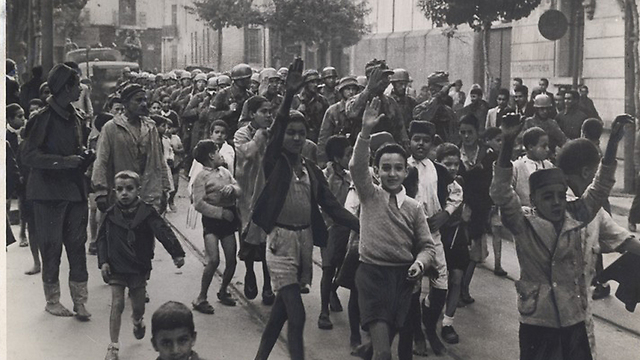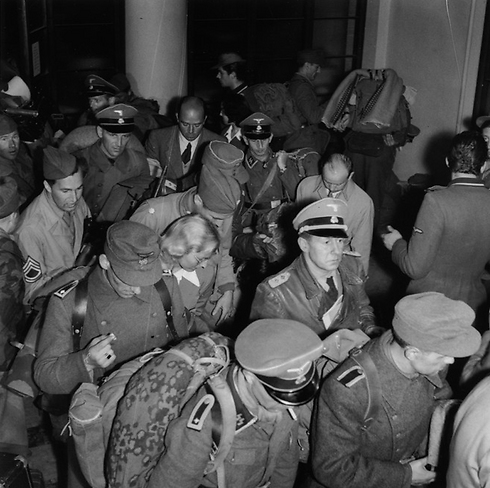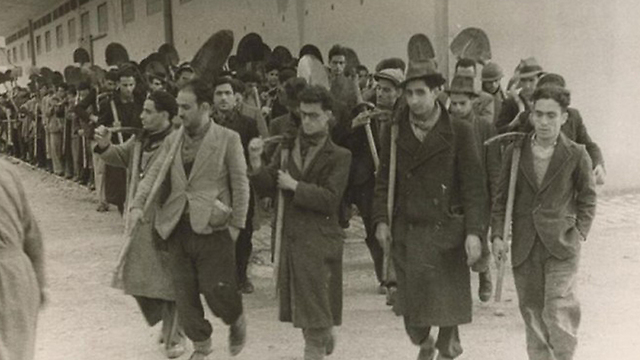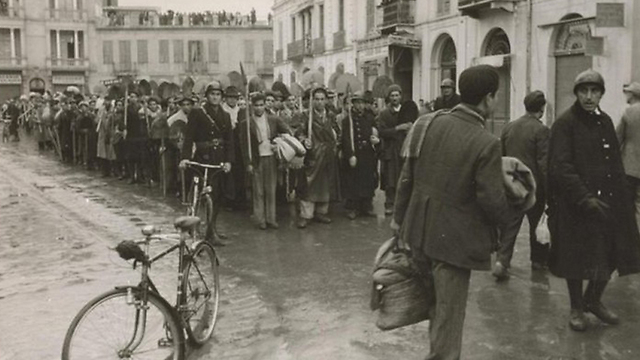Inside the diary of SS officer known as gas chamber 'mastermind' (original) (raw)
A new finding of the diary kept by Walter Rauff, the Nazi colonel credited with masterminding the "mobile gas chamber," sheds light on the Nazi conquest of Tunisia that lasted from November 17, 1942 and up until 1943.
- Follow Ynetnews on Facebook and Twitter The high-ranking SS officer was one of three German representatives who ruled Tunisia during that period. In his diary, Rauff describes the various plans the SS considered for the Jews - including using them has a human shields against approaching Allied Forces.
Tunisia during Nazi occupation
Rauff's diary is a collection of reports and daily entries that he sent from Tunisia to the Gestapo headquarters in Germany, and in them he described what was happening around him. Over the years, the diary was kept in London archives and recently made its way to a documentation center for North African Jews, and now has been translated into Hebrew. "Today, Kesselring's order arrived to recruit Jews for the work of building fortifications. In a meeting that took place with the acting commander, we agreed on how to fulfill this order," he wrote.
Walter Rauff center
"In the meantime, 3,000 Jews will be recruited by the operational force. The arrival of the Jews to the work sites and their overseeing will be the responsibility of the Wehrmacht (German forces). For this I set up a committee of Jews that will be responsible for this process to go smoothly.
"The first workers will be ready for work on the 7th of December in the morning. I gave in order to mark all the Jews that are coming to the work force with a yellow star. The financing, concern for food and sleep will be done by the Jews themselves, without strain on the German authorities. I announced that if the orders will not be completed, severe reprisals should be expected," wrote Rauff.
In December, 1942 the high-ranking German officers gathered for a crucial meeting. The topic was the draft ordinance for Jewish personnel for the benefit of the German army in 24 forced labor camps across the country. Thousands of Jewish youth were sent to these camps. A few years earlier, Rauff had been involved in the invention of the "gas van," a type of truck transformed into a mobile gas chamber and used to annihilate Jews and others. It was the precursor of the gas chambers in concentration camps, and some 200,000 people are believed to have been murdered in this way. In November, 1942, the German-Italian forces, under the command of Erwin Rommel, were defeated by Allied Forces in a battle known as "Al Alamein." Their defeat prevented a second advance of the Axis forces into Egypt.
In the meantime, US forces had landed in Morocco and in Algeria as part of "Operation Torch" and began to advance from Algeria toward the border between Tunisia and Algeria.
In order to prevent a situation in which German-Italian forces became trapped as they retreated from Libya, the Germans decided to place numerous forces in Tunisia in order to create a wedge between the incoming American troops advancing from east to west. This is how Tunisia fell into the hands of the Germans.
Tunisia was the only Islamic country that came under direct German occupation. During the six-month conquest, Tunisia was swept with war on two fronts in the south and the north. Constant shelling took its toll on the Tunisian people.
At the head of the Tunisian occupation stood Rauff, who commanded the entire Gestapo and deployment groups.
"Rauff did not operate based on feelings and did not trust anyone," says Dr. Haim Saadoun, who studied and translated Rauff's diary. "He tries to become the central figure to determine German policies in Tunisia, and does so in a strategic and organized way, with the assumption that Germany will win the battle in Tunisia and by doing so save the entire North African front for the Germans and the Italians. "He is a rationalist, organized and extemely sophisticated. He does not hurry to carry out his plans. He puts aside time to learn and build Germany's policies and his place in Germany's hierarchy."
On November 25, 1942, Rauff expressed concern that the Jews and the French were conspiring against the Nazi forces.
"The atmosphere in the city is more hostile than on previous days. The French and the Jews talk openly and say that in a short time enemy forces will conquer the city. The atmosphere among the Jews and the French is happy and hopeful, in contrast to the Arabs, who are very stressed and depressed. The military situation, naturally, is completely overshadowing the political situation."
Nine days later, Rauff sent another report, in which he came out against the plan of Rudolf Rahn, who served as a German diplomat to Tunisia. Rahn requested to turn the Jews into a sort of human shield against Allied forces that were expected to reach the state. "Today Rahn brought up in a meeting with the general the possibility of deporting 70,000 Jews to the west, towards enemy forces. I greatly warned against immediately putting this measure into practice, because this type of move would fail in every respect.
Tunisian Jewish men taken to forced labor camps
"I proposed that in the meantime the Jews should be marked. The decision has not yet been made, as it seems that the time has not ripened for these steps and they will cause unrest that German forces will not be able to handle," he wrote. Two days later it was decided to send the Jews to forced labor camps. Clement Hori was not an important character in the Tunisian Jewish community – he was not even a successful businessman. He was a simple Jewish man who lived in a new area in the capital of Tunisia. In 1942, he got a job as an administrative manager with a ship owner, a Jewish Italian named Gido Montifiori, and in that time wrote a diary in which he expressed his distress at being a Jew under German occupation, as well as the contrast to the peace and welfare that the family enjoyed until the Germans arrived, and the uncertainty during the occupation. In one entry he wrote, "I want to say that last night was quite noisy because the bombing began at 9 and did not stop for the entire night. The target was not (the) usual, but rather it seems as though it is a place further away. Was it an airport? Was it Le Gault? Like everyone, I stayed awake all night."
Tunisia during Nazi occupation
Yigal Halamit, who lives in Jerusalem today, was 12 years old at the time, and living with a family in Tunisia. "I remember that there was almost no food, I would stand every day for hours in a line in order to get bread." "Our neighbors were kicked out of their home, my uncle was taken hostage and overall we lived with twice the fear – on the one hand the Germans, and on the other the aerial bombings by the Allied Forces that devastated the city. We had to go sleep in a store with a basement because there were no shelters then. The Germans took all the Jews over the age of 18 to work camps, among them my two older brothers." Hori also wrote in his diary about the recruitment of the Jews of Tunisia to labor camps and describes the meeting of the recruitment committee during which Rauff demanded that the Jewish community levy the cost of the equipment, food and wages of the Jewish workers. "The prescribed amount is 20 million a month and the wealthy Jews were required to band together and take care of collecting this amount in order to satisfy the immediate demands. It seems that their demand was made and carried out," Hori wrote in his diary.
Hori also wrote of a young worker who disappeared one night, and arrived the next day after being captured while hunting and taken to a work camp. "He also said that 500 people were given only five water bottles and that everyone got one bun for dinner, each worth one penny. They spent the entire night outside, under the hood of the sky and pouring rain. Simply horrible! Barbarianism that fits the 15th century and we are living in the 20th!"
On the second week of December 1942, both diaries depict the German's decision to ban Jews from owning radios. Rauf writes in his diary on December 12: "According to the command of the supreme commander, today the ban begins on radio devices for the Jews, except for the radios of Jewish Italians. This move is being carried out smoothly, with the support and help of the French police. The confiscated devices are available to the German forces." The confiscation of the radios had two purposes, says Dr. Saadoun. "One was to prevent the Jews from hearing what is going on in Europe and the second was to enable the Germans to stay up-to-date on what is happening on the North African front, through BBC coverage."
Halamit added: "There were huge placards in the street that called on all Jewish males to register. My father and mother were very worried about the fate of my brothers who had been sent off - we had no contact with them. There were people from the community who took care of food for them and they sent us reports on my brothers' fate. About what was happening then in Europe we had no idea, we had no clue. I personally found out only two years later. I was shocked, we were all in astonishment."
The subject of the Jews – as much as it was important to the Nazis, became less significant to the Germans as the Allied Forces made their way closer to Tunisia.
Their prime concern was their inability to combat the Allied Forces, keep their commitments to Italy and their relationship with the French government and the Arab Tunisian Government, which continued to function in Tunisia.
In his diary, Rauff described the Arab population and its cooperation with the Nazis. "In the border regions the atmosphere is similar to that in Tunis: The French community assumes that the enemy forces will arrive soon and are awaiting it; the Arab community is friendly towards the Germans and is willing to help."
"The Arabs that we took to accompany us one the drive from the airport to the city were immediately released when we arrived, and they were given instructions to continue with their old ways, discover the general atmosphere and send us the addresses of the Jews whose homes and cars would suit our needs. The recruitment of Jews for work had a positive impact on the atmosphere in the Arab sector."
The cooperation of the Arabs was not enough to help the Germans, who were eventually defeated by the Allied Forces. At the end of March 1942, Rauff sent his final reports to the Gestapo commander in Germany – just before he escaped with the rest of the high-ranking officials in Tunisia.
Rauff made his way to Milan, Italy about two months before Tunisia was liberated from German occupation, but was caught by the Allied Forces. In December 1946, he managed to escape from a prisoner of war camp and was hidden at a monastery in Rome.
He succeeded in fleeing Italy, and in 1948 he was drafted into the Syrian intelligence service. Rauff lived in Damascus for a year, before moving onto Ecuador and eventually settling in Chile.
Extradition requests submitted by the Federal Republic of Germany in 1963 at the request of the Simon Wiesenthal Center were turned down by Chile. The Chilean Supreme Court declined on the grounds that the country's laws applied to the crimes Rauff was accused of committing, and that the statue of limitations had expired.
Rauff died a natural death in Santiego in 1984.
According to Dr. Saadoun, "the reports exposed from Rauff's diary are of the utmost importance in understanding German policy in Tunisia. For the first time, they give us a solid factual basis instead of the estimates and assumptions we had up until now."



